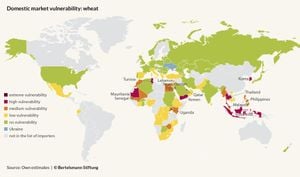On the evening of February 23, 1981, Spanish democracy faced one of its most perilous moments as armed Guardia Civil stormed the Congress of Deputies, led by Lieutenant Colonel Antonio Tejero. This failed coup attempt, which has become emblematic of the struggles between democratic forces and authoritarian ambitions, revealed the fragility of the post-Franco Spanish government.
The coup unfolded at 18:23 during what was supposed to be the parliamentary vote to elect Leopoldo Calvo-Sotelo as the new Prime Minister. Tejero’s audacious assault transformed the Congress chamber, as he shouted, "¡Quieto todo el mundo!" (Everyone freeze!), turning the political heart of Spain momentarily hostage.
While Tejero occupied the Congress, Lieutenant General Jaime Milans del Bosch proclaimed martial law from Valencia, where he deployed tanks on the streets, exacerbated by the near-total silence from military leaders who were either undecided or manipulated by the uncertainty of the situation.
For many Spaniards, the television broadcast of these events became surreal viewing. But it was King Juan Carlos I’s intervention just after midnight on February 24, which turned the tide against the coup. His televised address, dressed as captain general, declared, "I will order the civil authorities and the military to take all necessary measures to maintain constitutional order," thereby reaffirming his commitment to democracy.
The moment was pivotal. The King's announcement galvanized the nation, urging both citizens and military personnel to protect the constitutional order. His leadership exemplified the moral clarity required to thwart threats to democracy, reminiscent of past authors of authoritarian strikes.
After being swiftly condemned for their actions, Tejero, Milans del Bosch, and another prominent figure, Alfonso Armada, were sentenced to 30 years imprisonment. Tejero, reflecting on the coup years later, stated, "It was not about interested civilians; it was to create a military government," showcasing his misinterpretation of democratic will.
Years have passed since the coup, but discussions surrounding it persist, especially during anniversaries. Commemorations often serve as reminders of the importance of safeguarding democratic ideals. José Manuel Otero Novas, who was present during the event, remarked, "This was conceived as a coup with no bloodshed to avoid international condemnation," underlining how strategized the actions were, yet how providentially they did not escalate to violence.
Despite the attempt’s failure, it threw Spain’s fledgling democracy onto unsteady ground. The possibility of reverting to authoritarian rule loomed large, reminiscent of historical precedents, provoking fears among officials and citizens alike. It was alarming to think of what might have been, had the public and forces of law and order remained passive.
Fast forward to today, the 23F still resonates starkly within Spain. With various factions continuing to debate the historical narratives around events like the coup, the imperative for current generations remains clear. Every February 23rd carries with it reminders of how fragile democracy can be and how civic responsibility is fundamental.
Reflecting on the events of 1981, political analysts often argue such moments are opportunities for introspection and vigilance against the mere specter of authoritarianism. Journalist Pedro J. Ramírez, reporting on the aftermath said, "Tejero was again and again seen as merely part of the larger militaristic narrative, yet his involvement cast shadows longer than he realized."
Consequently, the historical lessons remain relevant. The past is not merely to be stewarded; it demands active engagement from today's society. Spaniards have continued to fortify their democratic institutions, ensuring they remain resilient against any future threats.
This history also resonates outwardly, reminding others internationally of their strides toward democracy. Observers see how each anniversary serves not only as remembrance but pragmatic reflection. The transition from the violent shadows of dictatorship to the audacity of democracy has been hard-won yet chargeably fragile.
Looking toward the future, one could argue the masters of the past are ever-present; vigilance is key to denying any semblance of resurrection. Spain's tale, bound tightly around the 23F, calls on each citizen to embrace their role within the democratic fabric and to proclaim, "¡Nunca más!" (Never again!)
Even as recent political movements across Europe send ripples of concern about authoritarian sentiments growing again, the Spanish coup attempt from 1981 serves as both cautionary tale and beacon of the importance of steadfast dedication to democratic obligations. Now, every February reminds Spaniards—and the world—that democracy, dependent on constant vigilance, remains the most valuable collective project they hold.



